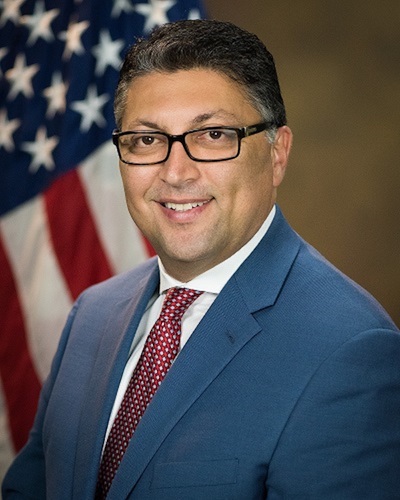On November 10, 2017, the Department of Justice’s (DOJ’s) new top antitrust enforcer, Assistant Attorney General (AAG) Makan Delrahim, delivered a powerful speech on antitrust law and policy enforcement towards intellectual property rights (IPRs).
Former USPTO Director David Kappos described it as “the most important DOJ antitrust speech on IP during my decades practicing law”. Makan’s speech (from here on, “the speech”) offers especially pronounced commentary for policies involving the much celebrated and discussed standards and related standard-essential patents (SEPs) upon which a patent holder has made a voluntary commitment to license on fair, reasonable, and non-discriminatory (FRAND) terms, providing a water-shed moment for anyone and everyone focusing on these issues.
The speech starts with the all-important issue of providing incentives for innovation and commercialization and the role of antitrust enforcement and IP policy. Recognizing the importance of standards in today’s modern economy, the AAG notes that “standards bodies are formed of both IP creators and implementers” and that the “dueling interests of innovators and implementers always are in tension, and the tension is resolved through the free market, typically in the form of freely negotiated licensing agreements,” acknowledging that neutral markets offer a more consumer welfare enhancing efficient approach than relying on central planners with imperfect and incomplete information.
The speech addresses the concern of “patent hold-up” — which has been the basis for the discussion on how antitrust law should police SSOs — the idea that a patent holder can hold-up implementers ex-post, after a standard is set, and opportunistically seek higher rents. Raised as a noteworthy concern by esteemed economist Carl Shapiro, empirical tests since potentially suggest that patent hold-up theory hasn’t manifested itself as a systemic problem, as predictions of the theory – increasing prices, stifling product markets, or more vertical integrated firms – didn’t hold in the standards and IPR intensive industries. Additionally, the hold-up theory as proposed by Nobel Laureate economist Oliver Williamson, is a symmetric concern, with both patent holder and implementer able to hold each other up. The speech goes a step further and expresses the concern that “too often lost in the debate over the hold-up problem is recognition of a more serious risk: the hold-out problem” which arises when “when implementers threaten to under-invest in the implementation of a standard, or threaten not to take a license at all, until their royalty demands are met.” The underlying economics of this conclusion is simple. Hold-up refers to one party in an incomplete contract taking advantage of a sunk cost (asset specific) investment. The patent hold-up theory is based on the ability of patent holders to hold-up implementers after the latter have sunk their costs in the processes of implementing the standards. But by the same token, the patent holders themselves have sunk their costs into the R&D for technology standards long before implementers. When the R&D investments were made, the risks were higher – will the technology be chosen for inclusion in the standard (only one third of proposals are usually adopted), will the standard succeed among competing options (several competing standards developed for the same technical problem fail), will the markets adopt the standard widely (the technology demand for some standards isn’t as high as originally anticipated) – vs. when the sunk cost investments by implementers are made. Thus, the speech recognizes that “if the implementers hold-out, the innovator has no recourse, even if the innovation is successful.” On the other hand, “the implementer has some buffer against the risk of hold-up because at least some of its investments occur after the royalty rates of the new technology could have been determined.” This observation is indeed true for some of the most widely deployed standards, such as 4G LTE, for which the major SEP owners had announced their maximum royalty rates before the standards were commercialized widely.
The speech therefore clarifies that the new AAG views “any policy proposals with one-sided focus on hold-up with great skepticism because they pose a serious threat on the innovating process,” and submits that antitrust law should not be misused to police the private commitments such as FRAND that IP holders make to SSOs. In this, the speech agrees with the view shared by several scholars that FRAND commitments are contracts and a potential breach of those commitments may not be best suited under the purview of antitrust law and that “there are perfectly adequate and more appropriate common law and statutory remedies available to the SSO or its members”.
The speech directly addresses how the fundamentals of patent law are currently at odds with some antitrust policy developments in the SEP related issues, specifically, on the seeking of injunctions for SEPs. The speech seems to clarify that SEPs are patents first, and “patents are a form of property, and the right to exclude is one of the most fundamental bargaining rights the patent owner possesses.” After the last several years of policy statements limiting the right of SEP owners to even seek an injunction, the speech offers a clear return to the importance to innovation of honoring an IPR holder’s core right to exclude, stating that “patent owners cannot violate the antitrust laws by properly exercising the rights patents confer, such as seeking an injunction or refusing to license such a patent.” It also makes clear that patent owners can decide how they want to exercise their property rights, and suggests that “under the antitrust laws, a unilateral refusal to license a valid patent should be per se legal.”
The speech is also a major step away from the former DOJ administration’s endorsement and support of the controversial amendments to the IPR policy of the IEEE – Standards Association, known for its flagship Wi-fi standards – in a Business Review Letter (BRL) issued in early 2015. The policy change and its endorsement in the BRL were motivated by the one-sided concern of potential hold-up by innovators. Licenses negotiated under a “threat of an injunction” were no longer deemed as comparable licenses. Perhaps most important for antitrust were the process related concerns. IEEE-SA’s IPR policy amendments were led by an ad-hoc committee of elected members, which created the first few drafts in closed doors before opening it up for comments by other companies. Several companies complained about a biased process, raising the concern with the DOJ to look into those concern. Empirical evidence suggests some bias – the comments made by those against the policy change were ~45% more likely to be rejected than those in favor, a statistically significant difference. The speech makes it very clear that “SSO rules purporting to clarify the meaning of “reasonable and non-discriminatory” that skew the bargain in the direction of implementers warrant a close look to determine whether they are the product of collusive behavior within SSOs.”
One of the most controversial changes of the IEEE IPR policy amendments is its defining how reasonable rates for SEPs should be determined, specifically, as compensation to the smallest saleable component practicing any portion of the standard. Other SSOs have considered and rejected these rules. For example, two major European SDOs CEN and CENELEC stated in their position paper that they do not support initiatives for SSOs to provide guidance on, or impose compliance with, FRAND pricing, valuation, and rate-setting methodologies, and they “firmly believe that pricing should be determined by patent holders and implementers outside of SSOs in the context of bilateral negotiations.” The idea of requiring the “smallest saleable patent practicing unit” as a royalty base and the starting point of negotiations is indeed odd, as it is meant to be an evidentiary rule specifically for jury trials for determination of patent damages, as explained by judges and scholars. The speech of the new AAG states exactly that: “while the so-called “smallest saleable component” rule may be a useful tool among many in determining patent infringement damages for multi-component products, its use as a requirement by a concerted agreement of implementers as the exclusive determinant of patent royalties may well warrant antitrust scrutiny”. It is further made clear that rather than encouraging or endorsing policy changes of private SSOs the Justice Department will do exactly what it should be doing – carefully scrutinize cartel-like behavior among SSO participants, either on the innovator or implementer side.
The speech concludes with certain clarity about what’s at stake and whose incentives are at play. The hallmark wireless cellular technologies – 3G, 4G, and now newly forming 5G standards – that we all use and depend upon, are a huge commercial success. The mobile industry is second only to necessities like oil, gas, auto, and drugs, in total sales revenues. This is a “high stakes game, and each side has an incentive to use every means necessary to improve its end of the bargain,” and thus, the new AAG notes instead of any one of the competitors, “the competitive market process should win.” Injecting antitrust law where it does not belong can cause serious harm to the competitive process and American consumers.
This speech from DOJ’s top antitrust enforcer comes after some notable recent developments in the United States and Europe. First, the acting FTC chairwoman Maureen Ohlhausen wrote an article presenting a critical review of FTC’s overreach by utilizing the Section 5 of the FTC Act to capture conduct outside Antitrust authorities’ remit, with regard to conduct involving standards and standard essential patents (SEPs). She also noted that international antitrust authorities have not approached standards and SEP related issues with appropriate rigor. Second, The EU (CJEU) issued a long-awaited judgement in Intel Corporation Inc. v European Commission, marking the importance of economic evidence for any effect on competition due to an alleged anticompetitive conduct.
And just this morning, the European Commission released a communications document setting out their policy for SEPs. The commission recognizes the concerns of both innovators and implementers of SEPs, considers it urgent to set out key principles to foster a balanced framework by “preserving fair and adequate return for contributions [to standards], and ensuring smooth and wide dissemination of standardised technologies”, endorses determination of FRAND royalty rates through bilateral negotiations, and stays away from any specific requirements related to licensing practices.
With all these developments, one hopes that we are entering a new era of restrained and evidence-based application of Antitrust Law and policy towards IP on both sides of the Atlantic.

![[IPWatchdog Logo]](https://ipwatchdog.com/wp-content/themes/IPWatchdog%20-%202023/assets/images/temp/logo-small@2x.png)


![[Advertisement]](https://ipwatchdog.com/wp-content/uploads/2024/04/Patent-Litigation-Masters-2024-sidebar-early-bird-ends-Apr-21-last-chance-700x500-1.jpg)

![[Advertisement]](https://ipwatchdog.com/wp-content/uploads/2021/12/WEBINAR-336-x-280-px.png)
![[Advertisement]](https://ipwatchdog.com/wp-content/uploads/2021/12/2021-Patent-Practice-on-Demand-recorded-Feb-2021-336-x-280.jpg)
![[Advertisement]](https://ipwatchdog.com/wp-content/uploads/2021/12/Ad-4-The-Invent-Patent-System™.png)







Join the Discussion
No comments yet.